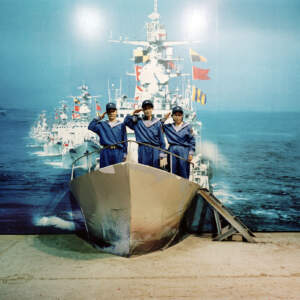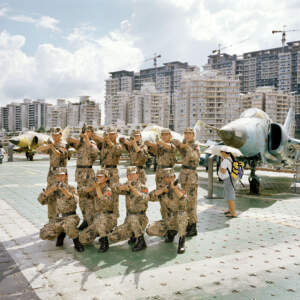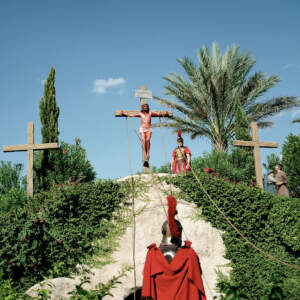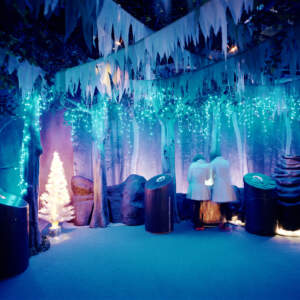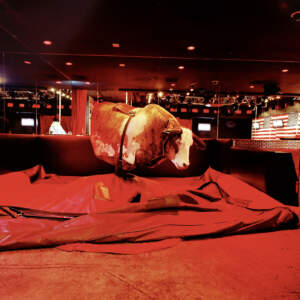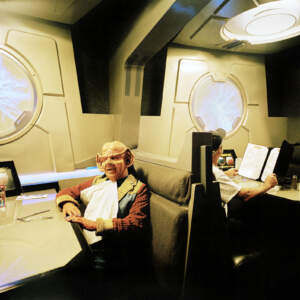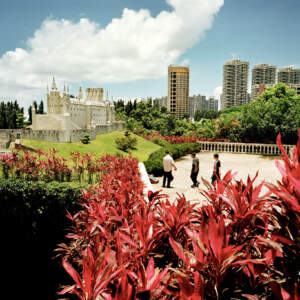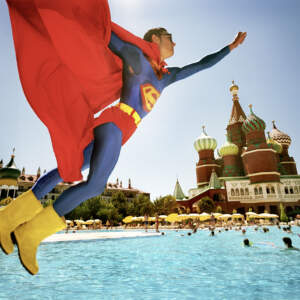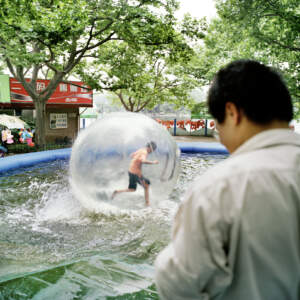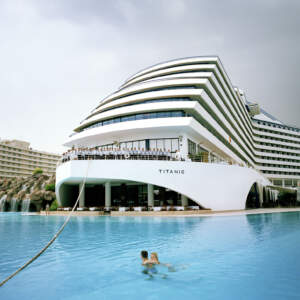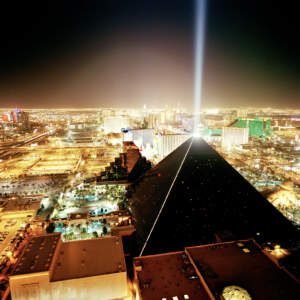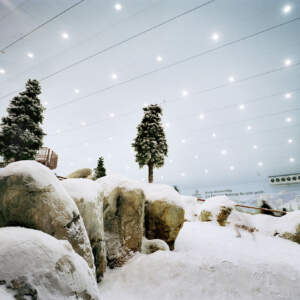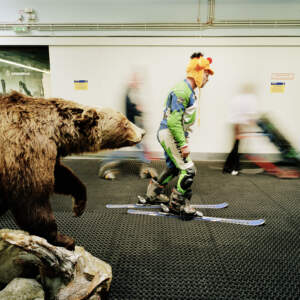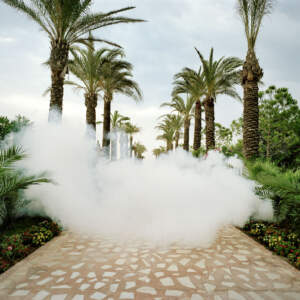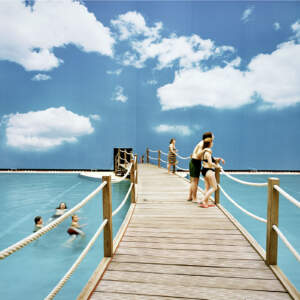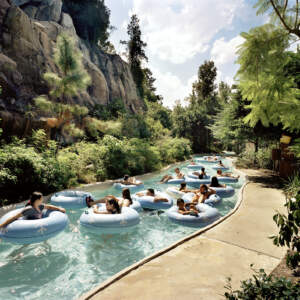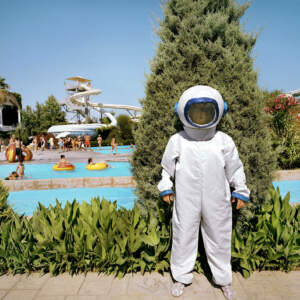Reiner Riedler
Fake Holiday
When wishes are out of reach, simulation is taking over our leisure time and our holidays. Imaginary worlds are created, often under massive technological exertion, in order to offer us experience as reproducible merchandise. Although the quality of these adventures on demand sometimes proves to be rather dubious, the boom does shed light on one thing: the yearnings and dreams underlying people’s daily lives.
—
Skiing, including the whole après-ski circus, in Dubai, singing gondoliers in front of an imitation of the Campanile in Las Vegas, an indoor South Sea beach at the “Tropical Islands” near Berlin – the range of artificial attractions vying for attention is expanding every day.
Here simulation plays a key role: it produces the additional emotional value that promises to put our experiences on a higher level. Thus the Allrounder Winterworld in Neuss, Germany guarantees to provide not only indoor skiing, but also “the enjoyment of everything that you expect from a great ski vacation.” Thus the facility does not create an impression akin to that of a functional skating rink, but boasts wooden huts and artificial pine trees bordering the slopes. The waitresses look like they just stepped out of The Sound of Music.
The bandwidth of such simulacra begins with charming low-budget self-made play worlds – for instance, those of role-players who cob together their own costumes and go camping in the woods, plunging into enchanted realms of their own design. At the other end of the scale, the leisure industry is investing seven-figure sums in theme parks and resort hotels like the Kremlin Palace on the Turkish Riviera, which also features a replica of Moscow’s St. Basil’s Cathedral.
Although most people consider authenticity and genuineness to be important values, the artificial attractions are already luring tourists away from traditional destinations. Eurodisney welcomes more visitors every year than Sweden, Denmark and Norway combined.
Social psychologists and tourism researchers have long since studied the way in which experiences become merchandise, and also critically investigated their quality. Apparently après-ski can also be staged to the customer’s satisfaction in Germany’s industrialized and densely populated Ruhr Basin, certainly to some extent because the “original” – the Alpine ski hut – has itself become a hyperreal construction of the tourism industry. When alleged “Indians” allow their guests to participate in dubious rituals in Wild West towns or at the aforementioned “Tropical Islands”, the impression created is not quite so authentic. The existence-threatening problems of indigenous peoples are kept out of sight here – fake worlds are idyllic and safe. Thus the cliches and distortions that arise when they attempt to mix in information or education are often glaring.
And yet the possible uses visitors find for such artificial environments are all the more interesting. On the grounds of the wild-west town “Pullman City” near Passau, Germany, nostalgists have built simple huts in the woods. There they spend their weekends and vacations, simulating life during the American Civil War. In the “Movie Park” near Gladbeck, there is a clique of season ticket holders, most of them unemployed young people, who spend every free minute in the relatively modest and simple world of the theme park. At the indoor ski park in Bottrop, two teenagers related how they spend their summer holidays in the skiing hall, working at the ski rental counter, snowboarding in the evening and then going to the “Alpine Hut”, which apparently is the best disco in the region. At night they sneak into a conference room for a few hours of sleep.
Operators like to argue that in certain respects their artificial worlds are even better than the real thing. There is sure to be snow even in summer, and the sand beach is hot all winter. No avalanches, no malaria, and getting there takes a fraction of the time. Those who want to experience a firefight or a film shooting can get what they want easily and safely at a theme park.
The range of “artificial” experiences available is increasing steadily, as is public acceptance of them, while the rapid pace of technological innovation is making them more realistic all the time. In the long run, widespread interaction with such attractions will likely diminish their novelty value and establish their position as another aspect of entertainment culture. There is no doubt that simulations will increasingly become a part of everyday life – hopefully enhancing it and not replacing it.
Text: Jens Lindworsky
Translation: Christopher Barber
- China, Shenzhen; “Photopoint” in the Themepark “Minsk World”. The Aircraft Carrier was built in the 70s by the Russians. After that it was sold to the Chinese in the late 90s, who decided to bring the Ship from Russia to China to restore it and make a Themepark out of it. It now lies in the harbour of Shenzhen and attracts thousend of tourists. © Reiner Riedler
- China, Shenzhen; Themepark “Minsk World”. The Aircraft Carrier was built in the 70s by the Russians. After that it was sold to the Chinese in the late 90s, who decided to bring the Ship from Russia to China to restore it and make a Themepark out of it. It now lies in the harbour of Shenzhen and attracts thousend of tourists. © Reiner Riedler
- USA; Florida; Orlando; The Holy Land Experience; Crucifiction © Reiner Riedler / Anzenberger
- Japan, Tokyo, Game Hall SEGA Joypolis, “Jungle” © Reiner Riedler / Anzenberger
- Las Vegas, Bull in a bar on “The Strip” © Reiner Riedler / Anzenberger
- Las Vegas, Star Trek Experience in the Hilton © Reiner Riedler / Anzenberger
- China, Shenzhen, Themepark Window of the World © Reiner Riedler
- Reiner Riedler, Superman over Red Square, Turkey, 2006
- China, Shanghai, “Bubbles” on the lake of the Shanghai Ocean Aquarium © Reiner Riedler
- Turkey; Antalya; Lara Beach; Titanic Resort Hotel © Reiner Riedler / Anzenberger
- Las Vegas, view don from th top of the Mandalay Bay © Reiner Riedler / Anzenberger
- Reiner Riedler, Tree #1, Ski Dubai, Dubai, 2006
- Germany; Indoor skiing hall “Alpin Center Bottrop” © Reiner Riedler / Anzenberger
- Turkey; Antalya; Lara Beach; Titanic Resort Hotel, worker spraying insecticids © Reiner Riedler / Anzenberger
- Reiner Riedler, Horizon #1, Tropical Islands, Germany, 2007
- USA, Florida, Orlando: Disney waterpark “Typhoon Lagoon” © Reiner Riedler / Anzenberger
- Reiner Riedler, Astronaut, Hotel Topkapi Palace, Turkey, 2006

